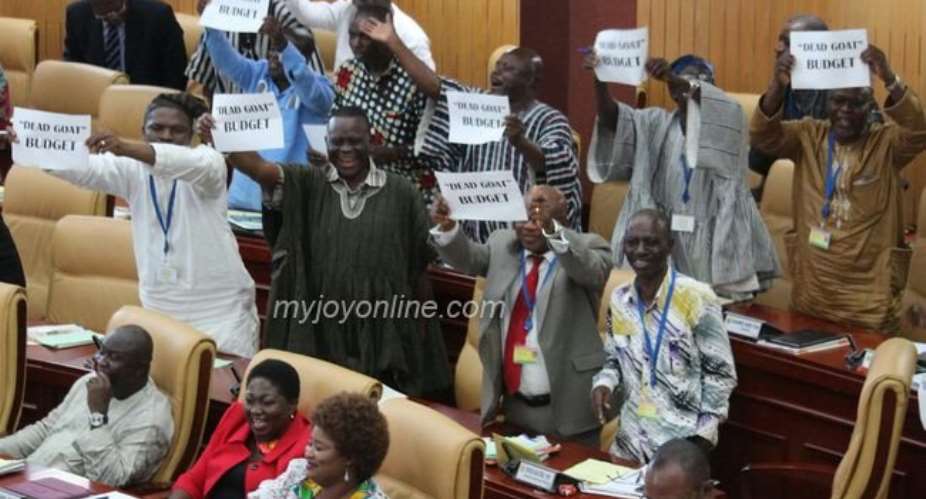Minority Leader Osei Kyei-Mensah-Bonsu has pooh-poohed on government’s financial statement for 2016, pointing to an uninspiring direction for a struggling economy.
Finance Minister Seth Terkper who presented the 2016 budget statement Friday to Parliament enumerated plans to consolidate macro-economic gains and also revive Ghana’s economy which some economists suggest is in coma.
But the Minority Leader is not convinced the 2016 statement paints any hope for the nation, indicating that its content is a true reflection of President Mahama's catchphrase: "I have a dead goat syndrome".
“This is a dead goat budget,” he told his colleague legislators when he seconded the motion to adjourn sitting after the Minister presented the budget.
Mr. Kyei-Mensah-Bonsu further explained that the budget is “full of perspiration but very little inspiration”.
In his view, what appeared to be government’s prudent plans to build the economy next year is nothing but a “trust betrayed budget”.
In unison, Members of Parliament on the Minority side overwhelmingly supported their leader’s description of the budget, brandishing placards boldly written, "Dead Goat Budget".
The 2016 Budget is themed: “Consolidating Progress towards a Brighter Medium Term”.
The consolidation agenda hinges on Government’s commitment to promoting fiscal discipline based on enhanced domestic revenue mobilization, prudent public expenditure management, improved debt management and the implementation of reforms in key areas of the economy, the Finance Minister explained.
SOME KEY HIGHLIGHTS OF THE 2016 BUDGET Finance Minister Seth Terkper
Finance Minister Seth Terkper
PUBLIC FINANCIAL MANAGEMENT REFORMS
- The PFM strategy was developed and approved by Cabinet, to further enhance the efficiency, transparency and accountability of the Public Financial Management Systems.
- A new PFM Bill is being drafted to be passed into law in 2016 to provide a stronger regime for budget planning and formulation, execution and monitoring.
FISCAL POLICY
- Create additional fiscal space for sustainable budget expenditures
- and enhance efficiency in tax administration, compliance and increase tax revenue.
TAX POLICY AND ADMINISTRATION
- Rollout fully the excise tax stamp project.
- Implement measures to address revenue leakages
- Introduce policies to rationalise and streamline the exemption policy.
- Re-imposition of Excise duty on Cider beer
- Review of Income Tax and VAT Threshold Bands.
NON-TAX REVENUE
- Wean-off Commissions, Agencies and Authorities into Companies including Driver and
- Vehicle Licensing Authority (DVLA); Environmental Protection Agency (EPA); and Energy Commission (EC).
EXPENDITURE MANAGEMENT INITIATIVES
- Manage the impact of the compensation bill through payroll management
- Strengthen the cash management system to include the B-Tracking, e-Travel Card, eFuel
- Card, and the Treasury Single Account.
SUSTAINABLE DEBT MANAGEMENT
- Progress is being made to ensure loan contracted with on-lending agreements by
- SOEs are recovered. Strengthen public debt management and operations.
- Limit the use of sovereign guarantees and encourage ring-fencing.
INFRASTRUCTURE DEVELOPMENT INITIATIVES
- Develop a draft National Infrastructure Plan
- Adoption of a new approach through Public Private Partnerships for infrastructure· development Ghana Infrastructure Investment Fund (GIIF)
OTHER INITIATIVES
- Job Creation/ Youth Employment Initiatives: 100,000 youth will be engaged under the
- Community Improvement Programme. Green House Project: train farmers, youth, women and agricultural graduates in commercial
- and modern greenhouse vegetable production in the country





 SSNIT must be managed without gov’t interference – Austin Gamey
SSNIT must be managed without gov’t interference – Austin Gamey
 Ejisu by-election could go either way between NPP and independent candidate — Gl...
Ejisu by-election could go either way between NPP and independent candidate — Gl...
 We never asked ministers, DCEs to bring NPP apparatchiks for returning officer r...
We never asked ministers, DCEs to bring NPP apparatchiks for returning officer r...
 No one denigrated the commission when you appointed NDC sympathizers during your...
No one denigrated the commission when you appointed NDC sympathizers during your...
 Used cloth dealers protests over delayed Kumasi Central Market project
Used cloth dealers protests over delayed Kumasi Central Market project
 A/R: Kwadaso onion market traders refuse to relocate to new site
A/R: Kwadaso onion market traders refuse to relocate to new site
 Dumsor: Corn mill operators at Kaneshie market face financial crisis
Dumsor: Corn mill operators at Kaneshie market face financial crisis
 Jamestown fishermen seek support over destruction of canoes by Tuesday's heavy d...
Jamestown fishermen seek support over destruction of canoes by Tuesday's heavy d...
 Election 2024: EC to commence voter registration exercise on May 7
Election 2024: EC to commence voter registration exercise on May 7
 Western Region: GWL hopeful of restoration of water today in Sekondi-Takoradi
Western Region: GWL hopeful of restoration of water today in Sekondi-Takoradi
